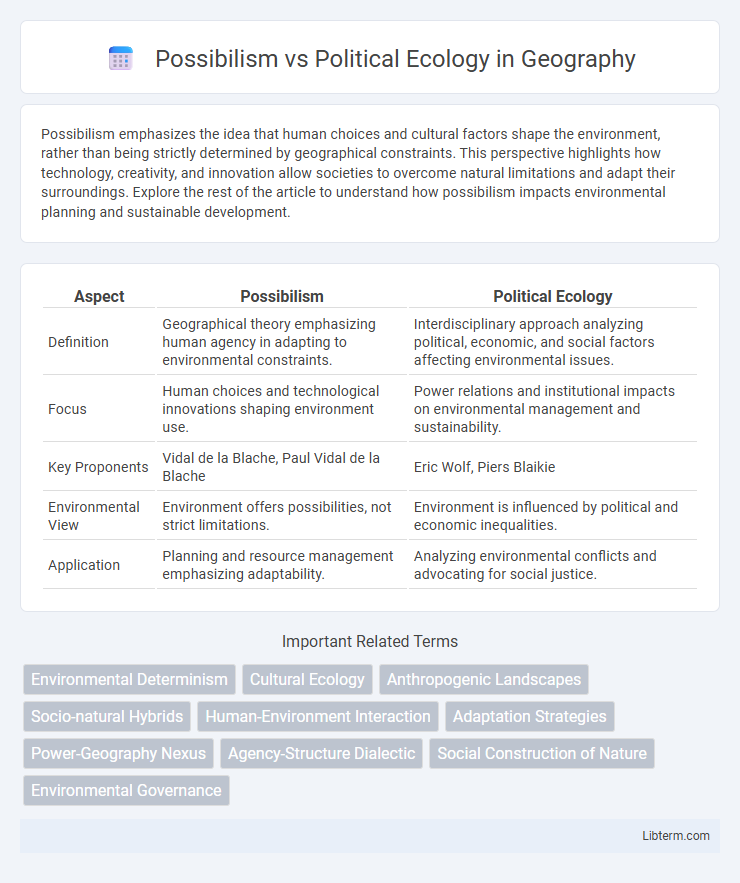Possibilism emphasizes the idea that human choices and cultural factors shape the environment, rather than being strictly determined by geographical constraints. This perspective highlights how technology, creativity, and innovation allow societies to overcome natural limitations and adapt their surroundings. Explore the rest of the article to understand how possibilism impacts environmental planning and sustainable development.
Table of Comparison
| Aspect | Possibilism | Political Ecology |
|---|---|---|
| Definition | Geographical theory emphasizing human agency in adapting to environmental constraints. | Interdisciplinary approach analyzing political, economic, and social factors affecting environmental issues. |
| Focus | Human choices and technological innovations shaping environment use. | Power relations and institutional impacts on environmental management and sustainability. |
| Key Proponents | Vidal de la Blache, Paul Vidal de la Blache | Eric Wolf, Piers Blaikie |
| Environmental View | Environment offers possibilities, not strict limitations. | Environment is influenced by political and economic inequalities. |
| Application | Planning and resource management emphasizing adaptability. | Analyzing environmental conflicts and advocating for social justice. |
Introduction to Possibilism and Political Ecology
Possibilism emphasizes the role of human agency in shaping environments by recognizing that while nature sets certain constraints, cultural choices and technological innovations determine societal development. Political ecology explores the complex interactions between political, economic, and social factors and environmental issues, highlighting how power dynamics and resource control influence ecological outcomes. Both frameworks offer critical insights into human-environment relationships but differ in focus, with possibilism stressing adaptive potential and political ecology emphasizing structural inequalities.
Historical Development of Environmental Theories
Possibilism emerged in the early 20th century as a response to environmental determinism, emphasizing human agency in shaping environmental outcomes, notably advanced by geographer Vidal de la Blache. Political Ecology developed in the 1970s, integrating ecological concerns with sociopolitical contexts, highlighting power dynamics and unequal resource distribution, as seen in works by scholars like Piers Blaikie and Michael Watts. Both theories mark a shift from deterministic views to more complex interactions between humans and environments in environmental scholarship.
Core Principles of Possibilism
Possibilism emphasizes human agency and the capacity to adapt and modify environmental constraints through technological innovation and cultural practices. It asserts that while the environment sets certain limitations, humans have multiple possibilities to shape their social and economic development independently from deterministic environmental factors. This core principle contrasts with Political Ecology's focus on power dynamics and socio-political structures influencing environmental interactions.
Key Tenets of Political Ecology
Political ecology emphasizes the interconnectedness of political, economic, and environmental factors in shaping human responses to ecological issues, critiquing the deterministic views of possibilism. It asserts that environmental changes and resource management are deeply influenced by power relations, social inequality, and historical contexts. Core tenets include analyzing how political economy drives ecological degradation, understanding ecosystems as socially constructed, and advocating for justice-centered environmental policies.
Human-Environment Interaction: Comparing Perspectives
Possibilism emphasizes human agency in shaping environmental outcomes, arguing that technological innovation and cultural practices enable societies to overcome natural constraints. Political ecology centers on power dynamics and economic inequalities that influence environmental interactions and resource access, highlighting how social structures affect ecological outcomes. Together, these perspectives illuminate the complex interplay between human choices and environmental limitations in shaping sustainable development.
Case Studies: Applied Possibilism and Political Ecology
Case studies of applied possibilism demonstrate how communities harness environmental constraints through innovative agricultural practices and local knowledge to achieve sustainable development, emphasizing human agency and adaptive strategies. Political ecology case studies highlight the influence of power relations, socioeconomic inequalities, and political processes on environmental management, revealing how environmental conflicts arise from structural injustices. Comparative analysis shows that while possibilism centers on human creativity in overcoming ecological limits, political ecology scrutinizes the role of institutional dynamics and governance in shaping environmental outcomes.
Criticisms and Limitations of Possibilism
Possibilism faces criticism for underestimating the influence of political, economic, and social power structures on environmental decision-making, limiting its capacity to address systemic inequalities and resource distribution. Political ecologists argue that possibilism's emphasis on human agency overlooks how environmental choices are constrained by external forces such as capitalist exploitation and state policies. This limitation reduces possibilism's effectiveness in explaining environmental degradation and conflict within uneven political contexts.
Controversies Within Political Ecology
Political ecology faces controversies surrounding its emphasis on structural inequalities and power relations, often criticized for overlooking individual agency and adaptability championed by possibilism. Scholars argue that political ecology's focus on conflicts and environmental degradation may neglect the nuanced interactions between humans and ecosystems highlighted in possibilist perspectives. The debate centers on reconciling top-down political-economic constraints with bottom-up human-environmental adaptability to develop holistic environmental management approaches.
Contemporary Relevance in Environmental Studies
Possibilism highlights human agency and technological innovation in shaping sustainable environmental solutions, emphasizing adaptation to natural constraints without deterministic limitations. Political ecology critically examines power dynamics, environmental justice, and the socio-political factors driving ecological degradation and resource distribution conflicts. Contemporary environmental studies integrate both frameworks to address climate change challenges, promoting equitable policy-making that balances human potential with structural environmental constraints.
Conclusion: Integrating Possibilism and Political Ecology
Integrating possibilism and political ecology offers a comprehensive framework to understand human-environment interactions by combining possibilism's emphasis on human agency and technological adaptability with political ecology's focus on power dynamics and environmental justice. This synthesis highlights how socio-political structures influence the range of environmental choices available to communities, enabling more equitable and sustainable resource management strategies. Embracing this integrated approach fosters more nuanced policy development that addresses both human creativity and structural constraints in environmental decision-making.
Possibilism Infographic

 libterm.com
libterm.com